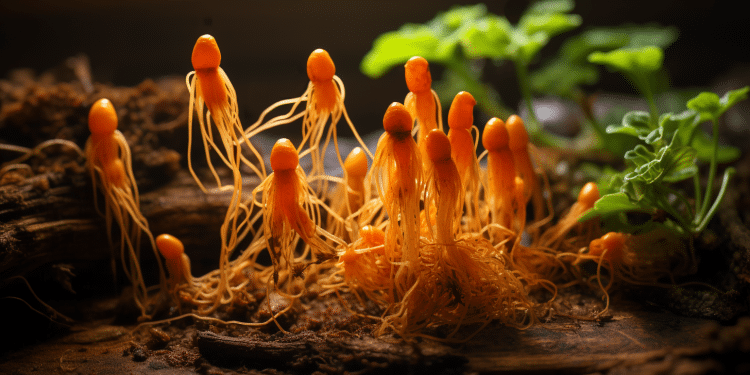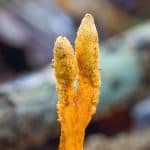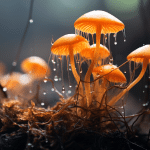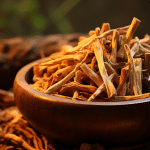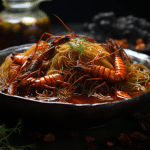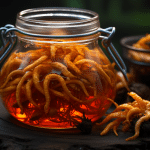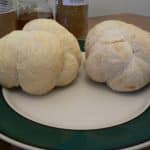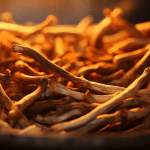Moderate-to-severe asthma has significant effects on a patients quality of health-related life. Cordyceps sinensis is a traditional Chinese medicine evaluated clinically in treatment of a number of diseases, such as chronic graft nephropathy, diabetic renal disease, and pulmonary fibrosis. But can cordyceps mushroom help with asthma?
What Is Asthma?
Asthma is a chronic upper respiratory tract condition resulting from hyperinflammation in the bronchial region and airway hyperresponsiveness. A large proportion of patients have uncontrolled asthma, which is due to increased IgE secretion, which results in recruitment of inflammatory cells. Asthma causes tremendous distress for millions, along with other co-morbidities, which may impair the health of affected individuals.
Does Cordyceps Help With Asthma?
So, does Cordyceps work for asthma as a potential therapy anyone could try? Many patients suffering from chronic asthma are seeking out complementary and alternative medicines therapies, including Traditional Chinese Medicine.
The results of this study suggest that using cordyceps for asthma has a beneficial effect on improving the symptoms of asthma. In addition, people taking part in the study reported an overall increase in their quality of life.
Cordyceps sinensis inhibits the tracheal constriction and allows increased airflow into the lungs, especially important in asthmatic individuals. A clinical trial with 50 asthma patients showed an 81.3% improvement in the treatment group using cordyceps over 5 days on average, compared with 61% in the treatment group using regular antihistamines over 9 days on average. While more studies need to be conducted, it does appear that cordyceps can help with asthma. Although you should always consult with your doctor before adding any additional supplement to your diet while on other medications.
There are highly large scale trials on humans demonstrating the beneficial tendencies in treating a variety of respiratory diseases, including asthma, COPD, and bronchitis, with cordyceps. In addition, mice fed with Cordyceps and exposed to extremely low oxygen environments were able to use oxygen more effectively (30-50% increased), tolerated acidosis and hypoxia (lack of oxygen) better, and lived 2-3 times longer than the control group.
Traditional Chinese medicine has promoted cordyceps for over one thousand years as the defender of respiratory health.
You can find our favorite capsules, powders, and tincture’s on the following pages of our website and learn more about each individually:
The Best Cordyceps Mushroom Gummies
This trend has begun attracting the interest of mainstream health care providers and scientific researchers. Cordyceps sinensis is a naturally occurring herb derived from a sac-like mushroom, which has been popular for centuries in China to maintain health and reduce fatigue. Due to Cordyceps sinensis rarity, a similar herb that contains Cordyceps active ingredients, Cordyceps militaris, is widely grown using fermentation techniques. Cordyceps militaris has been investigated as a regimen of anti-tumor, anti-metastasis, immunomodulation, and antioxidants, whereas in traditional usage, in Korea, China, and Japan, it is used in ethnopharmacological treatments for glucose metabolism, hypocholesterolemia, liver diseases, and diabetes.
In addition, cordyceps has demonstrated anti-infammatory effects in in vitro and/or in vivo models, such as raw LPS-induced macrophage cells and Balb/c mice infected with ovalbumin. It has been reported that Cordyceps blunts the hyperresponsiveness, mucous hypersecretion, and IgE production specific to ovalbumin in the murine model of asthma, though the precise mechanisms of action are not yet established.
L. Ganxhon, in her book, The Essentials of Traditional Chinese Herbal Medicine discusses the potential of the cordyceps extract in relieving symptoms of several respiratory diseases including chronic bronchitis, asthma, pneumonia, and phlegm. This is mostly attributed to the anti-inflammatory properties of cordyceps, as well as its ability to relax bronchial walls and facilitate enhanced oxygen utilization efficiency. Studies published in 1999 showed that extracts from Cordyceps may widen the bronchi, increase the effects of adrenaline in relaxing the bronchi, producing anti-inflammatory properties, and increasing tracheal secretion.
Additional Resources:
What is the best cordyceps dosage?
Updated 10/14/2022
